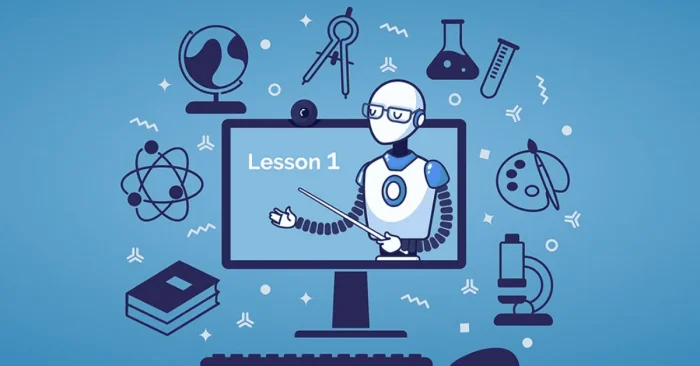Overview
AI tools for teacher lesson plans are transforming how educators design, organize, and deliver classroom content. These tools leverage machine learning and natural language processing to generate structured lesson outlines, suggest activities, and adapt content to different learning levels. Teachers can save time on planning while ensuring their lessons are engaging, inclusive, and aligned with curriculum standards. AI can also recommend multimedia resources, quizzes, and interactive exercises to match the topic. With real-time customization, teachers can create personalized learning experiences. Ultimately, AI lesson planning tools reduce workload, improve efficiency, and enhance overall teaching and learning outcomes for both students and educators.
1. AI for Automated Lesson Outlines
AI tools help teachers quickly create structured lesson outlines tailored to specific subjects and grade levels. By analyzing curriculum requirements, they suggest key topics, objectives, and activities that align with learning goals. Teachers simply input the subject, and AI generates a comprehensive plan within minutes. This saves valuable preparation time, allowing educators to focus more on teaching rather than administrative tasks. Automated outlines ensure that lessons remain organized and easy to follow. Additionally, AI can adapt outlines for varying class durations, making it flexible for different schedules. Such efficiency allows educators to deliver high-quality lessons consistently.
2. AI in Personalized Lesson Plans
Personalized learning is a growing trend in education, and AI plays a vital role by tailoring lesson plans to students’ unique needs. AI tools analyze student performance data and adjust the content accordingly. For example, struggling learners receive simplified explanations and extra exercises, while advanced students are provided with challenging tasks. This individualized approach ensures that every learner stays engaged and progresses at their own pace. Teachers benefit by having ready-made customized materials without additional effort. By focusing on each student’s learning style and abilities, AI-powered lesson plans enhance inclusivity and boost academic success across classrooms.
3. AI for Curriculum Alignment
Ensuring lessons match national or regional curriculum standards can be time-consuming. AI tools assist by automatically aligning lesson plans with specific guidelines, benchmarks, or standards. Teachers input their subject requirements, and the AI generates content that fits the educational framework. This helps maintain consistency and compliance across schools and districts. AI also highlights gaps in teaching materials, ensuring that no key concept is missed. By aligning seamlessly with curricula, teachers can feel confident their lesson plans meet academic expectations. This reduces the risk of missing critical learning objectives and strengthens the overall quality of education delivered to students.
4. AI-Powered Resource Recommendations
AI lesson planning tools recommend additional resources such as videos, worksheets, interactive quizzes, and real-world examples. Teachers can enrich their lessons with multimedia content that keeps students engaged and supports diverse learning styles. For instance, a history teacher might receive suggestions for documentaries, while a math teacher might get links to problem-solving apps. These resources make lessons more dynamic and relatable. Teachers no longer need to spend hours searching for supplementary materials, as AI curates relevant options instantly. By integrating various resources, lesson plans become well-rounded, interactive, and more effective in capturing students’ attention and improving knowledge retention.
5. AI for Time Management in Lessons
AI tools help teachers manage classroom time effectively by breaking lesson plans into sections with suggested time allocations. For example, they may recommend spending 10 minutes on introductions, 20 minutes on group activities, and 15 minutes on assessments. This ensures lessons flow smoothly and cover all objectives within the available timeframe. Time management features also allow flexibility, enabling teachers to adjust based on class pace. Such structured planning helps avoid rushed explanations or missed activities. By optimizing classroom time, AI ensures a balanced teaching approach where every segment of the lesson contributes meaningfully to student learning outcomes.
6. AI in Interactive Lesson Activities
AI-powered lesson planning platforms suggest interactive activities like group discussions, games, roleplays, or experiments to make learning more engaging. These activities cater to different learning styles, ensuring all students remain involved. Teachers can input lesson objectives, and AI generates activity suggestions aligned with the topic. Interactive methods not only make lessons fun but also improve student collaboration and critical thinking skills. AI saves teachers the effort of brainstorming new ideas by offering creative, tried-and-tested options. This ensures that lessons go beyond lectures, fostering active participation, deeper understanding, and long-lasting learning experiences for students across various grade levels.
7. AI for Assessment Integration
AI lesson planning tools integrate assessments like quizzes, homework tasks, and formative evaluations into lesson plans. Teachers receive suggested questions tailored to the lesson objectives, making evaluation seamless. AI can also generate differentiated assessments for varied learning levels. Immediate grading features further reduce workload, allowing teachers to focus on student support rather than manual evaluation. Integrated assessments ensure lessons are outcome-driven, with measurable progress tracking. By embedding testing into lesson structures, educators can monitor student performance continuously and adjust teaching strategies accordingly. This results in improved feedback, targeted interventions, and a more effective teaching-learning process overall.
8. AI for Collaborative Lesson Planning
Collaboration among teachers is vital for sharing best practices, and AI supports this by enabling collective lesson planning. AI tools allow educators to upload, share, and co-edit lesson plans on digital platforms. The system suggests improvements or merges ideas from multiple teachers into one optimized plan. Collaborative features ensure consistency in teaching across different classes and grades. Teachers benefit from peer contributions, reducing the burden of planning alone. This teamwork fosters innovation in education, where lessons are refined with diverse perspectives. AI thus transforms lesson planning into a cooperative effort that enhances creativity, efficiency, and teaching quality.
9. AI in Language Support for Lesson Plans
AI tools break language barriers by helping teachers create lesson plans in multiple languages or translate content instantly. This is especially useful in diverse classrooms with multilingual students. Teachers can design lessons in their preferred language, and AI translates them accurately while maintaining educational integrity. Language support makes content more accessible, ensuring every student can follow along. It also helps educators working in international schools or multicultural settings. By providing real-time translation, AI ensures inclusivity and eliminates communication gaps in learning. Multilingual lesson planning promotes equal learning opportunities for students from different linguistic and cultural backgrounds.
10. AI for Continuous Improvement of Lessons
AI lesson planning tools track lesson performance through feedback, student engagement data, and outcomes. They suggest improvements for future lessons by identifying strengths and weaknesses. For example, if a particular activity shows low student engagement, AI may recommend alternatives. Continuous improvement ensures that lesson plans evolve with teaching trends and student needs. Teachers receive actionable insights to refine their methods and content regularly. This feedback-driven approach leads to more effective and modern teaching practices. Over time, AI-powered lesson plans adapt to changing classrooms, providing sustainable benefits for both educators and students in achieving better educational outcomes.
(FAQs)
Q1: Can AI completely replace teachers in lesson planning?
No, AI assists teachers by saving time and enhancing efficiency, but human creativity and classroom understanding are still essential.
Q2: Are AI lesson planning tools suitable for all subjects?
Yes, AI tools support multiple subjects including math, science, history, and language arts, with customized content suggestions.
Q3: Do teachers need technical skills to use these tools?
Most AI lesson planning platforms are user-friendly and designed for educators without requiring advanced technical knowledge.
Learn More About AI Course https://buhave.com/courses/learn/ai/






